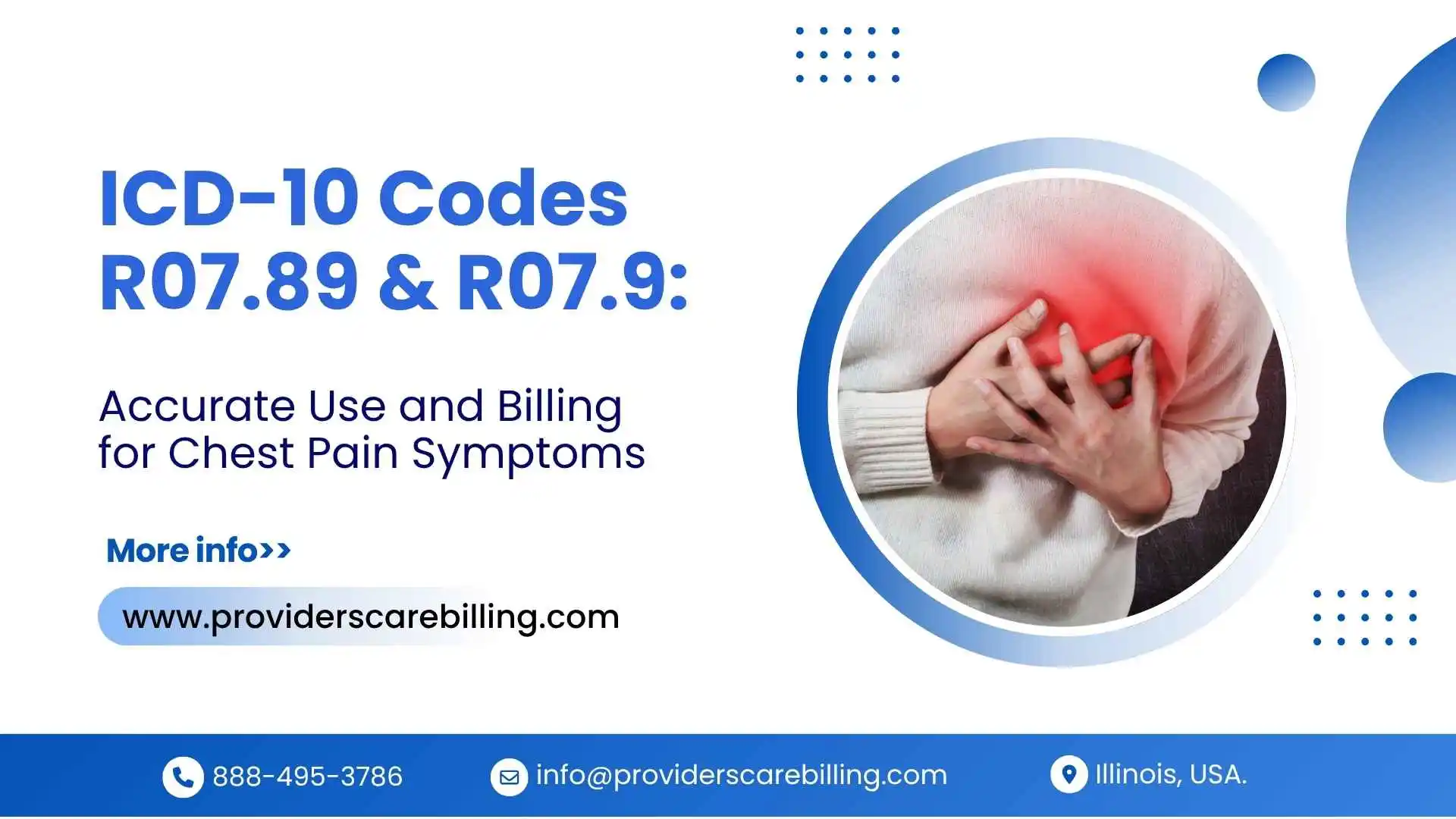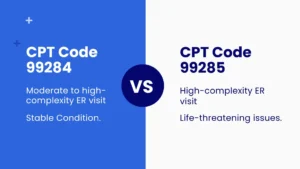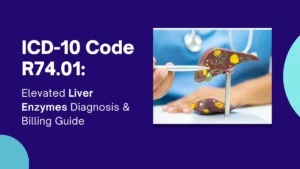Did You Know Chest Pain Accounts for Over 6.5 Million ER Visits Each Year?
This recent CDC statistics shows that chest pain is one of the leading reasons for Americans to visit emergency departments, and it is not always a heart-related condition, often requiring an accurate diagnosis code. Musculoskeletal problems, anxiety, and even acid reflux are some reasons chest pain can occur. This diversity creates a challenge in achieving correct coding, particularly when it comes to intercostal pain versus precordial pain. Of the numerous ICD-10 codes applicable to the scenario, the two most cited are R07.89 – Other Chest Pain and R07.9 – Chest Pain, Unspecified.
On the opposite end of the spectrum, the misuse of codes, in this instance, overusing R07.9, can result in claims denial, audits, and delayed payment. In this billing guide, we will discuss these codes and their scenarios along with the correct way to document symptoms such as atypical chest pain, pleuritic chest pain, and chest tightness to guarantee fidelity in billing.
What Is ICD-10 Code R07.89 – Other Chest Pain?
The R07.89 code of ICD-10 refers to the specific but known chest pain that cannot be classified into a specific diagnosis code, such as angina or costochondritis. It covers muscle sore chest pains, pleuritic pains in the chest, retrosternal pain, or pain with aggravation on deep breathing or movement, which may require different ICD-10-CM codes.
Example:
A 42-year-old female arrives at the clinic complaining of chest pain on the left side that is also aggravated by twisting and deep breathing. There is a normal ECG, and the provider suspects thoracic strain.
Proper code R07.89 – Other Chest Pain
When to Use R07.89:
- The chest pain that is musculoskeletal in origin
- Pleuritic or positional ( non-cardiac ) pain
- When associated with particular non-cardiac findings substernal or midsternal pain
- Chest wall pain with trauma or overuse
Billing Tips for R07.89:
- The quality of the records, their start, duration, and the absence of a cardiac explanation for the pain that was recorded
- Apply this code to imaging the chest (e.g., X-ray), EKG, or laboratory tests
- Do not misuse by considering unspecific or unreported symptoms
What Is ICD 10 Code R07.9 – Chest Pain, Unspecified?
R07.9 is a billable ICD-10 code utilized in case of chest pain that is present without additional details during the time of visit. It is an insufficient diagnosis, and it may just be a temporary diagnosis until more concrete results are out.
Example:
A 58-year-old guy arrives at the emergency room with a complaint of tightness in his chest. He is unable to tell of it being pressure, sharp, or radiating, which complicates the diagnosis code assignment. No diagnosis has been achieved so far.
Correct code: R07.9 -Cheapain, Unspecified
When to Use R07.9:
- Primary care that involves undifferentiated symptoms
- Emergency or immediate treatment without thorough examination
- Pending work-ups, such as lab reports or radiology, may include the need for specific ICD-10-CM codes.
- Telephone consults that do not contain physical exam information
Billing Tips for R07.9:
- Use as a temporary diagnosis awaiting the result of tests or consultation with the specialist
- Do not engage in repeated long-term use of R07.9 when no further clarification is made, because it may influence the assessment of medical necessity
- Overuse of R07.9, especially in specialist settings, may necessitate a medical evaluation.
R07.89 vs R07.9: Key Differences in Coding
| Feature | R07.89 – Other Chest Pain | R07.9 – Chest Pain, Unspecified |
| Specificity | Moderate | Very low |
| Usage Scenario | Known but non-classified pain | Unclear or undifferentiated pain |
| Risk of Denial | Low (with proper notes) | Higher (if used long-term) |
| Ideal For | MSK, pleuritic, positional chest discomfort | Initial assessments or incomplete history |
| Reimbursement Risk | Low with supporting documentation | Higher if the documentation is vague |
Documentation Checklist for Chest Pain ICD-10 Codes
This is a checklist of things to help assert clean claims or prevent denials:
- Quality: Harsh, feels dull, burning, crushing
- Location:-Substernal-, left chest wall, midsternal, retrosternal
- Duration and onset: acute, chronic, intermittent
- Related symptoms: dyspnea, nausea, radiation, anxiety
- Cardiac ruled out? MSK confirmed? GERD suspected?
- Orders made: EKG, stress test, X-ray, labs
If chest pain is accompanied by upper respiratory symptoms, be sure to review related codes like R05, R05.9, and J00 for cough and common cold.
Clinical Insight: Why Choosing the Right Code Matters
The difference between R07.89 and R07.9 may appear to be an insignificant detail; however, in billing, it comes out as a claim that has been paid or denied. Abusive use of non-specific codes, such as R07.9, will put your practice under medical review, or such a practice may result in payer audits. R07.89, on the other hand, indicates that the provider went out of his/her way clinically to eliminate cardiac causes and further classify the chest pain.
There are also more detailed codes, such as R07.89, that often justify higher CPT codes and more detailed diagnostic codes, allowing providers to capture every available dollar of their service, including R07.81 for pleurodynia. Payers would prefer to see that documentation and their diagnostic classification codes indicate intelligent clinical decision-making rather than guesswork.
Using accurate codes is not merely optional (as a compliance-related measure), but a badge of clinical professionalism as well as a strategic revenue weapon. Collaborating with entities such as Provider Care Billing LLC means that every visit for chest pains will be billed correctly, minimizing the denials and maximizing the credibility with insurance companies.
Fighting refused reimbursements because you coded for chest pains when you should have used the correct code? When you have ICD-10, CPT code, and compliance needs, leave it to the professionals at Providers Care Billing LLC.
📞 Call Now: 888-495-3786
📧 Email: Info@providerscarebilling.com
Book your free medical billing services now! Find out how to maximize your bottom line with coding chest pains.
Common CPT Codes Paired with R07.89 or R07.9
| CPT Code | Use Case |
| 93000 | Electrocardiogram (EKG) |
| 99214 | Outpatient visit with moderate complexity |
| 71046 | Chest X-ray |
| 78452 | Myocardial perfusion scan |
| 93306 | Echocardiogram |
Make sure CPT processes are in line with the symptoms, supporting documents, and medical requirements.
Final Thoughts
ICD-10 R07.89 and R07.9 codes might sound the same, yet mixing them up is not good for your revenue. R07.9 is more appropriate when dealing with early attending with cloudy symptoms, and one is safer, more specific, and cleaner with R07.89 when the clinical information is clearer.
By coding accurately coupled with good documentation, not only will better care be given to bettering the cash flow will also be improved. At Providers Care Billing LLC, we enable practices to apply the correct codes at the correct time, thus allowing your staff to become less concerned about other aspects, such as patient outcomes.
Frequently Asked Questions
- Is R07.9 long-term usable?
No. It is only supposed to be used on a temporary basis, and it can easily prompt audits in case it is used excessively.
- Does R07.89 bill musculoskeletal chest pain?
Yes, provided that we have documentation that eliminates cardiac and other reasons.





